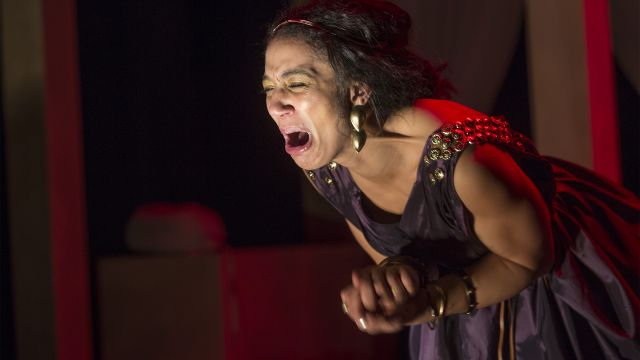Medea
The character of Medea will be known forever as ‘the woman who killed her children’. Of course, it’s more complicated than that. A despised outsider – a ‘barbarian’ - in Corinth, driven mad (or is she?) when she is dumped by her opportunist, social climber husband, Jason, for a younger model, and she and her children by him are about to be sent into exile…
The challenge in mounting this nearly two thousand, five hundred year old text is to remember that this telling of the story, for all its psychological acuity and possible proto-feminism, is not ‘naturalistic’. It’s not ‘the royal family next door’. This is a pre-Christian world and there is a ritualistic, incantatory quality to the text. In this production, there are passages that achieve this – chiefly from the Chorus (Jennifer Vuletic and Brigid Gallacher). (Ms Vuletic also brings another characteristic choric note to her dual role as the Nurse: that of the fretting but powerless observer.) The Chorus’ contrapuntal chanting of the lines, punctuated by single handclaps, has the feeling of ancient ceremony, portending doom, and creates a chill down the spine.
Christopher Brown too achieves this too. As the Messenger (he also plays an Attendant, King Creon and King Aegeus), his account of the death of Jason’s new bride, Glauke, and her father King Creon, is clear, measured and horrifying. The Greeks (and indeed Shakespeare) knew that a graphic description of an event off-stage, that works on our imaginations, can be far more powerful than an unconvincing representation on stage. Mr Brown delivers superbly.
Philip Cameron Smith also gives us very effectively a Jason hardly distinguished by his having won the Golden Fleece. He’s a strutting, smug and self-serving ‘hero’, so much so that you almost feel he deserves what he gets.
Naomi Rukavina looks wonderful and is suitably exotic as the ‘barbarian’ brought to Corinth by Jason. Unfortunately, she has not yet found the phrasing or variations of pitch that might give her character the majesty and power the role requires. She’s not helped by beginning in a wild, near hysterical rage at her character’s predicament, thus leaving the actress nowhere to which to build. I wonder whether director Andrew Blackman encouraged this or simply let it go. Ms Rukavina comes into her own when she becomes the manipulative seductress of the vain Jason, not least because she slows down and savours the text.
 Euripides’ intention was that Medea’s last appearance be above the stage - in the chariot of the Sun God Helios with the corpses of her murdered children – and he created some controversy by using the rising scaffolding meant for such things as the arrival of the goddess Athena. In this production Euripides’ coup de théâtreis somewhat diminished: Medea appear in a different, white robe and a golden headdress, surrounded by wreaths of smoke.
Euripides’ intention was that Medea’s last appearance be above the stage - in the chariot of the Sun God Helios with the corpses of her murdered children – and he created some controversy by using the rising scaffolding meant for such things as the arrival of the goddess Athena. In this production Euripides’ coup de théâtreis somewhat diminished: Medea appear in a different, white robe and a golden headdress, surrounded by wreaths of smoke.
But this is a no-frills production, possibly suitable for touring to schools, something Complete Works does in great quantity – and good on them for it. The Chorus is but two Women of Corinth (disconcertingly supplemented by mannequins in red cloaks and masks either side of the stage). The set by designer Zoe Rouse, is simple but suggestive, and her costumes are rich and detailed. (I’d question the make-up choice for the Chorus: their eyes circled with black. Perhaps the intention is to approximate the masks worn in ancient Greece, but the effect here verges on the comic: ‘racoon’ does spring to mind.) Julia Knibbs’ lighting is all to the point, but may be a touch obvious to the extent that the changes are perhaps too noticeable. Finn Cooney’s music (or sound design) is suitably ominous, but at times drowns the actors in thunder and rolling waves.
Nevertheless, much of the audience on opening night was clearly held, horrified and deeply moved. It’s interesting that in the play competition of 431 BCE, Euripides’ Medea placed third out of three. Perhaps the Athenians too had a problem with an actively vengeful female protagonist. And yet Medea survives and the winners of that year are forgotten. As Mr Blackman says in his programme note, Euripides’ themes ‘are still being played out today, challenging us to ask if human nature has really changed that much at all.’ It’s commendable that Complete Works, Mr Blackman’s team and cast give us the opportunity to see this still powerful and relevant classic play.
Michael Brindley
Subscribe to our E-Newsletter, buy our latest print edition or find a Performing Arts book at Book Nook.

